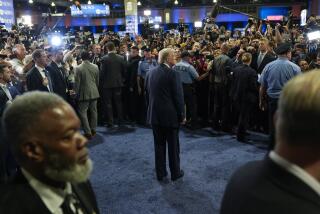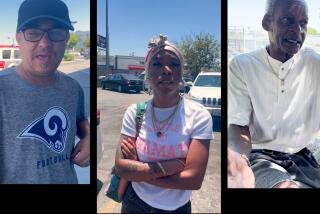Bush Fails to Impress Uncommitted Voters : Poll: Most said he is out of touch. Some said Clinton seemed studied and many were impressed by Perot.
- Share via
WASHINGTON — In the days leading up to Sunday’s presidential debate, 47-year-old James Sevigny just could not figure out which candidate to support. By the time the debate ended, he had at least narrowed the choices down a bit.
“This evening, I’ve totally ruled out Mr. Bush,” Sevigny said Sunday night. “His torch has passed.”
For more than a week, Bush aides have sought out reporters to explain that Sunday’s debate would be the crucial moment when the President would restart his stalled campaign. He failed. That, at least, is the judgment drawn from the 42 uncommitted voters surveyed by Times reporters after the debate as well as opinion polls released Monday.
Many of the voters--drawn from those surveyed by the Times Poll last week--came away impressed by Ross Perot, but their favorable reaction to him vied with their disinclination to vote for a candidate many referred to as a “quitter” and one who, in any case, they do not believe can win.
Some liked Clinton, saying he appeared calm and levelheaded, although others complained that he seemed too well-rehearsed, too pat in his answers--”a Ken doll,” one Colorado voter called him.
And some liked Bush, primarily those who already had leaned in his direction before the debate. But for many, Bush simply did not make much of an impression at all. A slip of the tongue by one Republican voter from Indiana--perhaps indulging in a bit of wishful thinking--seemed to sum up part of Bush’s problem. Asked whom she thought she would vote for, she said, “probably Reagan.”
Overwhelming the other responses was one fact: Among the people interviewed, not a single person who had previously leaned toward Clinton had moved back to the President.
Bush angered several of the voters by repeatedly proclaiming an optimistic view of the country. “I don’t go for flowery stuff,” said Wilma Erbe, 71, a lifelong Republican who lives on a farm in eastern Kansas and thinks she may now vote for Perot. “He tried to make it appear that there are a lot of things right that I think are wrong,” she said of Bush.
Bush’s heavy reliance on that strategy was somewhat unusual given that it has backfired several times on him during the past year. As far back as last fall, for example, Bush hurt himself by trying to convince voters that the economy was not really in a recession. Polls showed later that his remarks fueled a widespread sense that he was out of touch with the lives of ordinary Americans. A similar strategy, however, did appear to help Gerald R. Ford in his 1976 race against Jimmy Carter--a race managed by Bush’s current campaign chief, James A. Baker III.
Baker also figured in another debate gambit that appeared not to have accomplished much--the President’s announcement that the former secretary of state would move to an economic policy slot after the election. That move fell completely flat with the voters interviewed--a reminder, perhaps, that while Baker’s name may be one to conjure with inside Washington, it has little magic elsewhere in the country.
Asked open-ended questions about what moments in the debate stuck in their minds, only one person even mentioned Baker, and her response was dismissive. “It seemed like he (Bush) was grasping at straws,” said Susan, a schoolteacher from North Tonawanda, N.Y., who did not give her last name.
Not surprisingly, those who liked what Clinton had to say tended to talk about the need for change. Those who liked Bush talked of trusting him and of finding Clinton too slick, untrustworthy or dishonest. And those who preferred Perot voiced skepticism about the political system in general.
To test reaction to the debate, Times reporters contacted uncommitted voters--those who did not have a candidate preference or who said they were uncertain about their choice--who had told pollsters last week that they would agree to subsequent interviews by reporters. Roughly one-third of the voters surveyed last week fell into the uncommitted category.
Nightly tracking polls conducted for television networks generally showed results consistent with those in the uncommitted sample--some increase in support for Perot but no significant shrinkage in Clinton’s lead over Bush. The voters contacted by The Times do not constitute a scientific poll. They are too few in number for a reliable sample. More important, looking only at uncommitted voters probably overstates support for Perot, who draws much of his support from voters dissatisfied with Bush and Clinton.
Nonetheless, the opinions of the uncommitted group do matter. They are the voters Bush must try to win over in large numbers and in a hurry if he is to have any chance of overtaking Clinton. Sunday seems to have brought him no closer to that goal.
Even some of those voters who said they leaned toward Bush voiced disappointment with his performance.
“I am a Republican and had been favoring Bush slightly. But he took too much time telling what he didn’t like about Clinton being in Moscow,” said 75-year-old Agnes Markey. “I have threatened not to vote,” she added--a sentiment which, if it spreads, could hurt not only Bush, but also Republican candidates further down the ballot.
Similarly, Sevigny, a private contractor who voted for Bush four years ago and for Ronald Reagan in the two elections before that, proclaimed himself “thoroughly disgusted” with what he called Bush’s “mudslinging campaign.” With unemployment in his area of southern New Hampshire near 13%, Sevigny said he thought the candidates should not be rehashing the events of the Vietnam era.
Several voters objected that Bush and Clinton seemed too cold and “political” in comparison with Perot’s folksy witticisms. As for Perot, some complained that he gave few specific answers about what he would actually do if elected. Many more, however, said they were impressed by his straightforward manner.
“I was more impressed than I thought I would be with Perot,” said Angela Sheaffer, a 23-year-old nursing student from Manassas, Va. “He didn’t beat around the bush,” she said. “That really impressed me.”
Kathryn Darrow, a 30-year-old high school teacher from Norwood, Colo., had a similar reaction. “I sure enjoyed Ross Perot,” she said. “He kind of made you believe.”
But make-believe is what came to other voters’ minds as they watched Perot talk. Edna Carlton, a 71-year-old retiree from Macclenny, on Florida’s west coast, is a Perot fan. “I like the little feller,” she said. “He’s the man for the hour.”
But she does not really consider Perot one of the candidates, she added. “I really don’t think Perot can make it this time,” she said. And because of that, she doubts that she will vote for him.
Kathie Cook, a 41-year-old South Carolina schoolteacher, had a similar reaction. “Ross Perot certainly did steal the show,” she said. “He was quite the performer.” But, she quickly added, “I still would not vote for him. He certainly is not presidential material.”
Bush, for his part, drew praise from those impressed by his handling of foreign affairs. But as has been true throughout the campaign, those people were a minority.
Times staff writers Matt Marshall in Washington and David Reyes in Orange County, special correspondents Gary Boulard in New Orleans, Mike Clary in Miami, Lianne Hart in Houston, Lyn Riddle in Simpsonville, S.C., and researchers Douglas Conner in Seattle and Edith Stanley in Atlanta contributed to this story.
Today on the Trail . . .
Gov. Bill Clinton campaigns in Williamsburg, Va.
President Bush has no public events scheduled.
Ross Perot has no public events scheduled.
TELEVISION
Sen. Al Gore, James B. Stockdale and Vice President Dan Quayle participate in the vice presidential debate at 4 p.m. PDT at Georgia Tech in Atlanta. ABC, NBC, CBS, CNN, PBS and C-SPAN will televise the debate.
More to Read
Get the L.A. Times Politics newsletter
Deeply reported insights into legislation, politics and policy from Sacramento, Washington and beyond. In your inbox twice per week.
You may occasionally receive promotional content from the Los Angeles Times.











